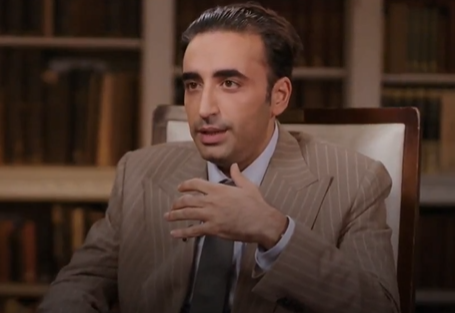
Former Pakistan Foreign Minister Bilawal Bhutto Zardari may no longer hold office, but his conduct suggests otherwise. Despite stepping down, he continues to issue statements on global platforms with the confidence of an active foreign minister. His latest appearance in an interview with Al Jazeera has stirred serious controversy, especially over his unsolicited remarks defending the UN-designated terrorist Masood Azhar.
In the interview, Bhutto confidently claimed that Pakistan has no information about Masood Azhar’s whereabouts. He even suggested that Azhar could be hiding in Afghanistan. With this statement, he subtly shifted the blame onto the Afghan Taliban, implying that the problem lies across the border. Bhutto argued that if India truly has evidence that Azhar is in Pakistan, it should share it with Islamabad, and only then would Pakistan act. He further added that Masood Azhar was active during the Afghan jihad, which makes it plausible he might be on Afghan soil.
But this raises serious questions. Bilawal Bhutto, who is not part of the current Pakistani cabinet and holds no official portfolio, continues to act as though he is still running the country’s foreign affairs. His statements not only contradict Pakistan’s official silence but also signal confusion and denial within the country's foreign policy ranks.
Bhutto also took a clear dig at Western powers in the same interview, criticizing them for treating the Afghan Taliban as the legitimate rulers of Afghanistan. This is deeply ironic. After all, it was Islamabad that spent years whitewashing the image of Taliban 2.0, presenting them to the world as a "reformed" force and lobbying for international recognition on their behalf. Pakistan’s narrative then was that the Taliban had changed, were stable rulers, and could be partners in the region’s future.
Now, because the Taliban have refused to act as Pakistan’s proxy against India, suddenly their credibility is being questioned. Bhutto’s narrative flips entirely. He says that if NATO couldn’t capture Masood Azhar during their presence in Afghanistan, then it is unrealistic to expect Pakistan to do so now. This kind of statement isn’t just inconsistent—it exposes a deeper hypocrisy. It reveals how Islamabad shifts narratives based on convenience and strategic interests.
It would not be surprising if this sparks a fiery reaction from the Afghan Taliban. Pakistan’s tendency to use its neighbors as diplomatic punching bags may not go unanswered. By accusing the Taliban of sheltering Azhar while previously lobbying for their global legitimacy, Islamabad may have just ignited a backlash that could further complicate its already tense relations with Kabul.
All of this comes in the wake of India’s bold military operation, Operation Sindoor, which targeted and destroyed terror camps in Pakistan. The Indian Army struck Jaish-e-Mohammed’s base in Bahawalpur and Lashkar-e-Taiba’s facilities in a simultaneous operation. The mission dealt a heavy blow to Pakistan’s deep state—its military, its intelligence agency ISI, and its terror infrastructure. But among those most visibly disturbed was Bilawal Bhutto, who, despite having no official role, sprang into action with interviews and defensive commentary as though he were the face of the government.
It is worth noting that Bhutto’s Pakistan People’s Party is part of the current ruling coalition, although he himself holds no government position. Nevertheless, he seems to believe it is his duty to act as Pakistan’s international spokesperson. He continues to campaign globally against India, claiming New Delhi uses Pakistan’s name to malign it in the international community. Yet when it comes to confronting actual terrorism, he retreats into denial, deflection, and blame-shifting.
His logic is self-defeating. On one hand, he claims Masood Azhar is possibly in Afghanistan, indirectly absolving Pakistan of responsibility. On the other, he says NATO couldn’t capture him, so Pakistan shouldn't be expected to. That’s hardly a position of strength or credibility—it’s an open admission of helplessness, and worse, of unwillingness.
In conclusion, Bhutto’s remarks not only expose Pakistan’s inconsistencies in dealing with terrorism but also illustrate how its leaders play both sides of the coin. One moment they lobby for terrorist-aligned regimes, the next they accuse those same regimes of harboring fugitives. This doublespeak is no longer going unnoticed, and as regional dynamics shift, Pakistan may soon find that its old tricks no longer earn international sympathy or support.
Disclaimer:
This article is based on publicly available statements and news reports. It presents an independent analysis of geopolitical events and does not represent any government or institutional viewpoint.




